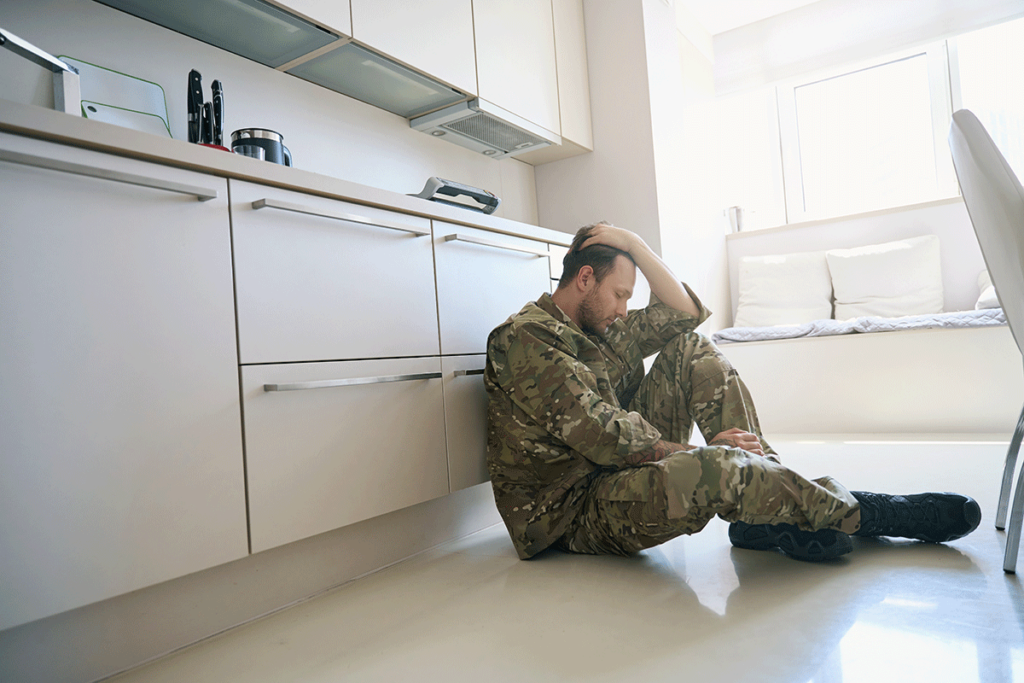Each year, millions of veterans struggle with a substance use disorder. In fact, nearly a third of veterans with SUD struggle with alcohol use disorder. It is important to understand the relationship between veterans and addiction if you or a loved one is a veteran. Alcoholism is a treatable disorder that requires behavioral therapy and medication-assisted treatment to reach recovery goals in a timely manner.
The Ranch in Tennessee welcomes veterans with a substance use disorder brought on by post-traumatic stress disorder (PTSD). If you think you can benefit from our dual diagnosis treatment program, call 1.844.876.7680 today to speak with our compassionate team.
The Relationship Between Veterans and Addiction
Serving in the military is an honorable commitment with significant risk. Many veterans suffer from post-traumatic stress disorder (PTSD). In fact, veterans who were wounded in the line of duty struggle with symptoms of PTSD.
Post-traumatic stress disorder includes a number of symptoms:
- Experiencing flashbacks of the event
- Having nightmares and insomnia
- Avoiding situations or people that remind them of the trauma
- Feeling tense, edgy, or easily startled
- Having negative thoughts or feelings of guilt or shame
- Drug and alcohol abuse
Veterans and addiction caused by PTSD go hand-in-hand. If the drug and alcohol abuse continues, it can lead to a serious addiction and complicate the recovery process, especially if they are unaware they have PTSD.
At The Ranch, we welcome veterans with a co-occurring disorder of PTSD and substance use disorder. Our team will evaluate you and develop a comprehensive treatment program that includes behavioral and holistic therapies and medical support.
Treating Trauma and Substance Abuse
Treating trauma and substance abuse at the same time requires dedication and a commitment to changing your ways for the better. Therapists will dive deep to uncover the past trauma and build healthy coping systems for dealing with your symptoms and triggers. Here are some of the ways that they do this:
Medication-Assisted Treatment
To ease addiction withdrawals and cravings, clients receive medication to reduce the symptoms that are causing a problem. Medical staff will administer specific medications to each client and monitor them for any adverse side effects. As their symptoms diminish, they will begin tapering off the medication to avoid any withdrawals.
Behavioral Therapy
Cognitive-behavioral therapy (CBT) is one of the most well-known behavioral therapies that treat PTSD and substance use disorders. It helps clients recognize and identify the behaviors that are triggered and find new ways to cope. This can be calling a trusted friend, reciting a personal mantra, or learning to say no in a way that everyone understands.
Holistic Therapy
Another way of coping with trauma is through holistic therapy and life skills training. Clients will participate in meditation and mindfulness therapy, equine-assisted therapy, nutrition education, art and play therapy, and other life skills training. These skills promote a healthy lifestyle and long-lasting sobriety.
Relapse Prevention Therapy
Relapse rates are very high during the first few months of recovery. Therapists work to help clients identify situations that increase their risk and what they can do to avoid relapsing. This is a skills-based cognitive-behavioral approach that is shown to decrease relapse rates and improve retention rates in the program.
Family Therapy
Recovery is a team effort, and the bigger your support team is, the better. All family members are encouraged to participate in family therapy, where they will learn all about the disorder and what it takes to recover. They will also learn how to create a stable and supportive environment where you can thrive.
Call The Ranch to Join Our Dual Diagnosis Treatment Program Today
The Ranch is a full-service mental health treatment facility where veterans who struggle with PTSD and addiction can find support. If you are a veteran battling addiction and PTSD, call 1.844.876.7680 today or complete our web form to schedule a visit and take that first step toward recovery.

